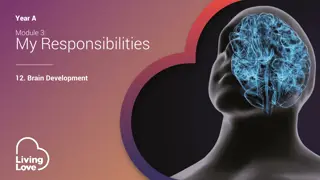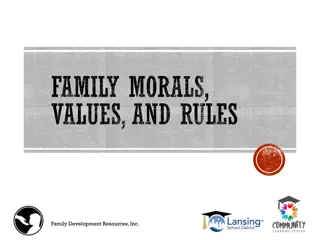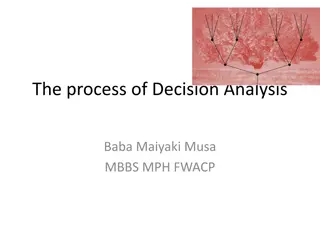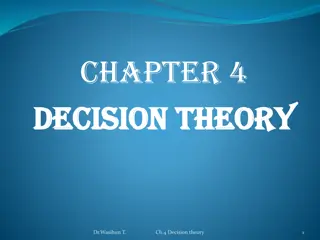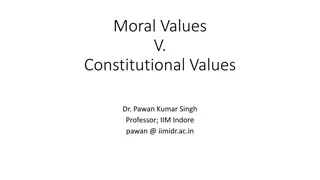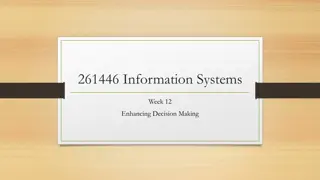
Understanding Ethical Values and Effective Decision Making Process
Explore the significance of ethical values in decision-making, distinguishing ethics, morals, and values. Learn about key ethical values like honesty, integrity, respect, and more. Delve into the process of effective decision-making, including identifying purposes, gathering information, evaluating alternatives, and executing decisions systematically.
Download Presentation

Please find below an Image/Link to download the presentation.
The content on the website is provided AS IS for your information and personal use only. It may not be sold, licensed, or shared on other websites without obtaining consent from the author. If you encounter any issues during the download, it is possible that the publisher has removed the file from their server.
You are allowed to download the files provided on this website for personal or commercial use, subject to the condition that they are used lawfully. All files are the property of their respective owners.
The content on the website is provided AS IS for your information and personal use only. It may not be sold, licensed, or shared on other websites without obtaining consent from the author.
E N D
Presentation Transcript
Ethical Values and Decision Making Mr. Vijay Sansare Assistant Professor
Differences Ethics describes a generally accepted set of moral principles. Morals describes the goodness or badness or right or wrong of actions. Values describes individual or personal standards of what is valuable or important.
Meaning of Ethical Values To behave ethically is to behave in A manner that is consistent with what is generally considered to be right or moral. Ethical behaviour is the bedrock of mutual trust. Individually or organizationally, values determine what is right and what is wrong, and doing what is right or wrong is what we mean by ethics.
Ethical Values Honesty Integrity Self-Discipline Faithfulness Promise-keeping & trustworthiness Loyal
Ethical Values Respect for others Concern for others / service Dignity and worth of person Social justice Competence
Decision Making The thought process of selecting a logical choice from the available options. When trying to make a good decision, a person must weight the positives and negatives of each option, and consider all the alternatives. For effective decision making, a person must be able to forecast the outcome of each option as well, and based on all these items, determine which option is the best for that particular situation.
Decision Making Effective decision making is defined here as the process through which alternatives are selected and then managed through implementation to achieve business objectives. 'Effective decisions result from a systematic process, with clearly defined elements, that is handled in a distinct sequence of steps. [Drucker, 1967].
Goal/Aim Appropriate Information Alternatives Decision Making Execution Evaluation Analyze
7 Steps of Decision Making Process Step 1: Identification of the purpose of the decision Step 2: Information gathering Step 3: Principles for judging the alternatives Step 4: Brainstorm and analyse the different choices Step 5: Evaluation of alternatives Step 6: Select the best alternative Step 7: Execute the decision
5 Steps to Good Decision Making - Kescia D. Step 1: Identify Your Goal. One of the most effective decision making strategies is to keep an eye on your goal. ... Step 2: Gather Information for Weighing Your Options. ... Step 3: Consider the Consequences. ... Step 4: Make Your Decision. ... Step 5: Evaluate Your Decision.
Read more: http://www.businessdictionary.com/definition /decision-making.html

